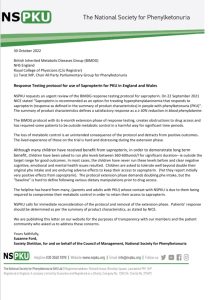
The NSPKU is requesting a review of the sapropterin testing pathway for people with PKU in England and we have written this letter to the British Inherited Metabolic Diseases Group, as well as to NHS England, the Royal College of Physicians, and the Chair of our All Party Parliamentary Group, Liz Twist MP.
We are asking that the current protocol will be reviewed as a matter of urgency as contacts with the PKU community through our helpline show that patients are having adverse experiences through the testing protocol.
The letter is here:
30 October 2022
British Inherited Metabolic Diseases Group (BIMDG)
NHS England
Royal College of Physicians (C/o Registrar)
Liz Twist MP, Chair All Party Parliamentary Group for Phenylketonuria
Response Testing protocol for use of Sapropterin for PKU in England and Wales
NSPKU requests an urgent review of the BIMDG response testing protocol for sapropterin. On 22 September 2021 NICE stated “Sapropterin is recommended as an option for treating hyperphenylalaninemia that responds to sapropterin (response as defined in the summary of product characteristics) in people with phenylketonuria (PKU)”. The summary of product characteristics defines a satisfactory response as a ≥ 30% reduction in blood phenylalanine.
The BIMDG protocol with its 6-month extension phase of response testing, creates obstructions to drug access and has required some patients to be outside metabolic control in a harmful way for significant time periods.
The loss of metabolic control is an unintended consequence of the protocol and detracts from positive outcomes. The lived experience of those on the trial is hard and distressing during the extension phase.
Although many children have received benefit from sapropterin, in order to demonstrate long term benefit, children have been asked to run phe levels between 360-600umol/l for significant duration– ie outside the target range for good outcomes. In most cases, the children have never run these levels before and clear negative cognitive, emotional and mental health issues resulted. Children are asked to tolerate well beyond double their original phe intake and are enduring adverse effects to keep their access to sapropterin. (Yet they report initially very positive effects from sapropterin). The protocol extension phase demands doubling phe intake, but the “baseline” is hard to define following various dietary manipulations prior to drug access.
The helpline has heard from many, (parents and adults with PKU) whose contact with NSPKU is due to them being required to compromise their metabolic control in order to retain their access to sapropterin.
NSPKU calls for immediate reconsideration of the protocol and removal of the extension phase. Patients’ response should be determined as per the summary of product characteristics, as stated by NICE.
We are publishing this letter on our website for the purposes of transparency with our members and the patient community who asked us to address these concerns.
Yours faithfully,
Suzanne Ford,
Society Dietitian, for and on behalf of the Council of Management, National Society for Phenylketonuria
